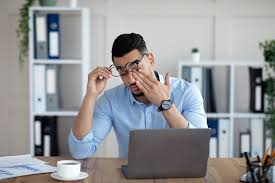Most people think of vision problems as something that “just happens” with age — but in reality, the small things we do every day can quietly chip away at our eye health. From long hours on screens to skipping regular check-ups, these habits add up, leaving your eyes strained, fatigued, and more vulnerable over time.
And while treatments like laser eye surgery cost in Melbourne are becoming increasingly affordable and effective, prevention is always better than correction. Protecting your eyesight starts with recognising the subtle ways you may be harming it without realising.
1. Staring at Screens for Hours Without Breaks
It’s almost impossible to avoid screens — they’re part of how we work, relax, and communicate. But spending hours focused on a glowing monitor causes your blink rate to drop dramatically, drying out your eyes and straining the muscles that control focus.
Over time, this can lead to what’s known as digital eye strain, with symptoms like headaches, blurred vision, and irritation. The fix is simple: use the 20-20-20 rule — every 20 minutes, look at something 20 feet away for 20 seconds. It gives your eyes the reset they desperately need.
2. Forgetting to Blink or Hydrate
It’s not just screen time — even reading, driving, or focusing on detailed tasks can make you blink less. Combine that with dehydration, and your eyes lose the moisture that keeps them comfortable and clear.
To help, stay hydrated throughout the day and consciously blink more when you’re focusing intently. If you work in air-conditioned or dry environments, using artificial tears can also relieve irritation and prevent long-term dryness.
3. Rubbing Your Eyes Too Often
It’s tempting when your eyes feel tired or itchy — but rubbing them can cause more harm than relief. The pressure from rubbing can damage delicate tissues, introduce bacteria, or even worsen certain conditions like keratoconus, which affects the cornea’s shape.
If your eyes frequently feel uncomfortable, it’s better to use lubricating drops or see an optometrist to rule out allergies or dryness.
4. Skipping Sunglasses on Bright Days
UV damage isn’t just a skin concern — your eyes are equally vulnerable. Prolonged exposure to sunlight without proper protection can lead to cataracts, macular degeneration, and other long-term issues.
Invest in a good pair of sunglasses that block 100% of UVA and UVB rays — not just tinted lenses. Wearing them regularly can make a huge difference, especially if you spend a lot of time outdoors or driving.
5. Sleeping in Contact Lenses
It might feel harmless to doze off wearing your contacts “just this once,” but that’s when infections and irritation can start. Sleeping in lenses reduces oxygen flow to the eyes and creates the perfect environment for bacteria to grow.
Even if your lenses are labelled “extended wear,” it’s still better to remove them at night and give your eyes a rest.
6. Ignoring Regular Eye Exams
Your eyes can change without obvious symptoms — and by the time vision problems become noticeable, damage may already be done. Regular eye exams help detect issues early, from prescription changes to signs of glaucoma or diabetes-related complications.
Adults should aim for an exam every one to two years, depending on age and risk factors. It’s a small step that can protect your long-term vision and catch silent problems before they worsen.
7. Poor Sleep and Constant Stress
Lack of sleep affects every part of your body — including your eyes. Fatigue can cause twitching, dryness, and blurred vision, while chronic stress contributes to inflammation and strain.
Prioritising rest and relaxation isn’t just good for mental clarity; it’s essential for keeping your vision sharp.
Building Better Eye Habits
Protecting your eyes doesn’t require drastic lifestyle changes — it’s about small, consistent habits. Here’s a simple checklist to start with:
- Keep your screens at least an arm’s length away and slightly below eye level.
- Follow the 20-20-20 rule to reduce strain.
- Eat a diet rich in omega-3s, leafy greens, and antioxidants.
- Stay hydrated and avoid rubbing your eyes.
- Always wear UV-blocking sunglasses outdoors.
- Schedule regular eye exams — even if your vision feels fine.
Your eyesight is one of your most valuable assets, and once it’s compromised, it’s hard to restore naturally. While modern treatments can correct many issues, daily care is what truly preserves long-term clarity.
Take small steps today — your future self will see the difference, quite literally.
